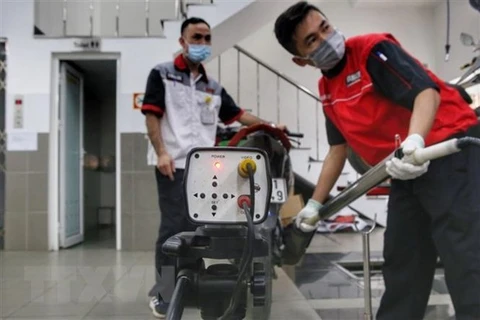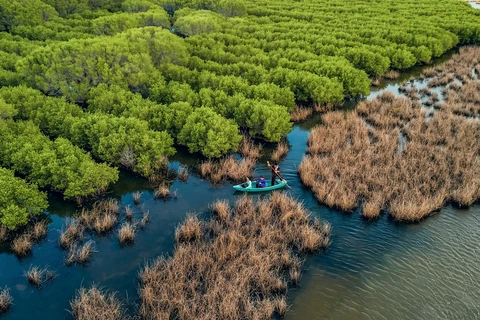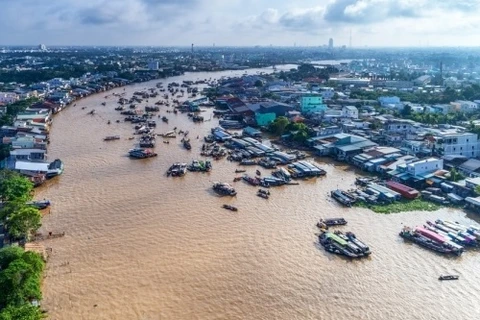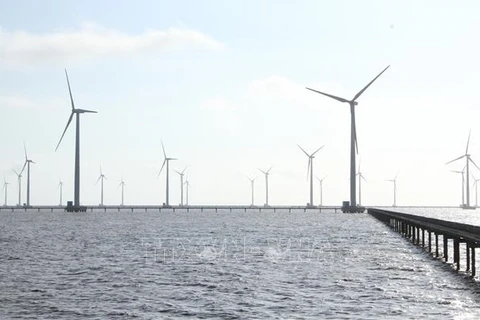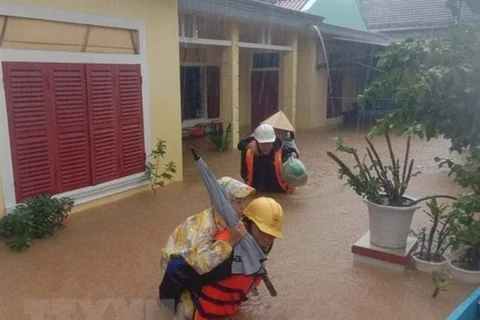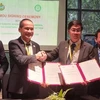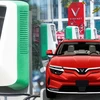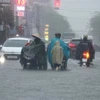 A forest grown on sand in a coastal commune of Trieu Phong district, the central province of Quang Tri (Photo: VNA)
A forest grown on sand in a coastal commune of Trieu Phong district, the central province of Quang Tri (Photo: VNA) Hanoi (VNA) – The Ministry of Natural Resources and Environment (MoNRE), which is the standing agency of Vietnam’s working group on climate change negotiations, held a workshop on December 7 to announce the outcomes of the 26th Conference of the Parties to the United Nations Framework Conference on Climate Change (COP26), held in Glasgow, the UK, from October 30 to November 13.
In his opening speech, Minister Tran Hong Ha said COP26 was highly successful, marking a breakthrough transition in the world’s development model, from a model based on fossil fuels to low-emission development, towards net zero emissions.
Notably, countries committed to strongly promoting the transition to clean energy and quickly putting an end to the use of coal. Besides, international financial sources for coal-fired power generation will be terminated soon and switched to funding the development of renewable energy and circular economy, forest conservation and development, and ecological protection.
Aside from the Katowice Climate Package approved at COP24 in 2018 and the Glasgow Climate Pact at COP26, a rulebook guiding the implementation of the Paris Agreement was basically completed, according to the minister.
Ha noted that Vietnam has been following the global development trend, which is also shared by developed countries with economic and technological strength, by committing to reducing emissions to net-zero and taking part in the Global Methane Pledge.
This is also a chance for Vietnam to develop, he added.
Pham Van Tan, Deputy Director of the MoNRE’s Department of Climate Change, said the country’s strong commitments and responsible opinions made at COP26 have received high evaluation from the international community and opened up many opportunities for cooperation in promoting low-emission development, circular economy, and climate change adaptation.
In particular, the Law on Environmental Protection, amended in 2020, and the draft decree on reducing greenhouse gas emissions and protecting the ozone layer have been built in a way that matches the latest agreements in climate change talks. Completely in line with the new rules adopted at COP26, they will serve as an important legal basis for involving the entire society in climate change response.
Low-emission development will be the main trend, in which Vietnam will have to continue comprehensively changing its development model from the one based on fossil fuels and natural resources to a low-emission model, Tan went on.
However, he pointed out that the biggest challenge to Vietnam now is how to mobilise and maintain the engagement of the entire political system when the transition process is long and difficult, the country lacks domestic resources, and complicated administrative procedures have hampered foreign resources’ entry into the country.
Meanwhile, human resources in the country haven’t been able to apply advanced production technologies and processes, the official noted.
Ambassador Giorgio Aliberti, head of the European Union Delegation to Vietnam, held that to realise the outcomes of COP26, the country should keep improving the awareness and determination among all-level authorities, sectors, localities, organisations, and individuals to stay persistent in the transition.
The Government and Prime Minister of Vietnam should quickly issue a decree on greenhouse gas reduction and ozone layer protection, a list of facilities that have to inventory their greenhouse gas emissions, and a plan on the carbon market development, he said, adding that these documents have been made basing on the Paris Agreement and the guidelines on the implementation of the Paris Agreement.
On the other hand, Vietnam should actively enhance cooperation with international partners in terms of finance, technology, and capacity for implementing the Paris Agreement and the commitments made at COP26, the diplomat added./.

